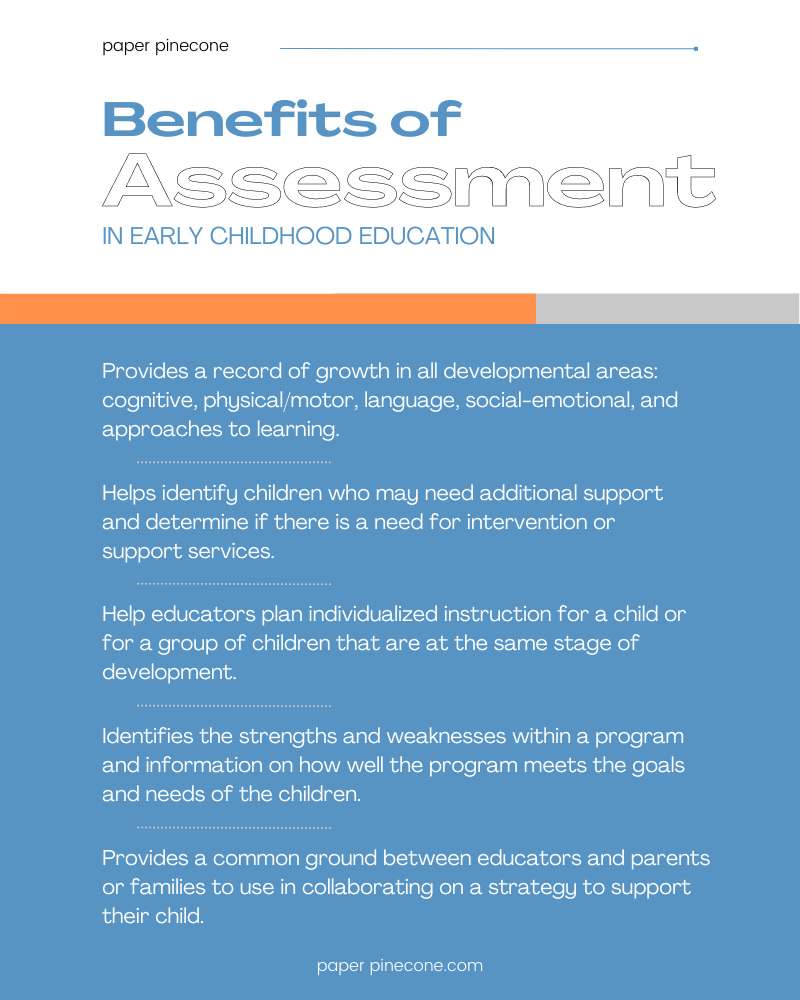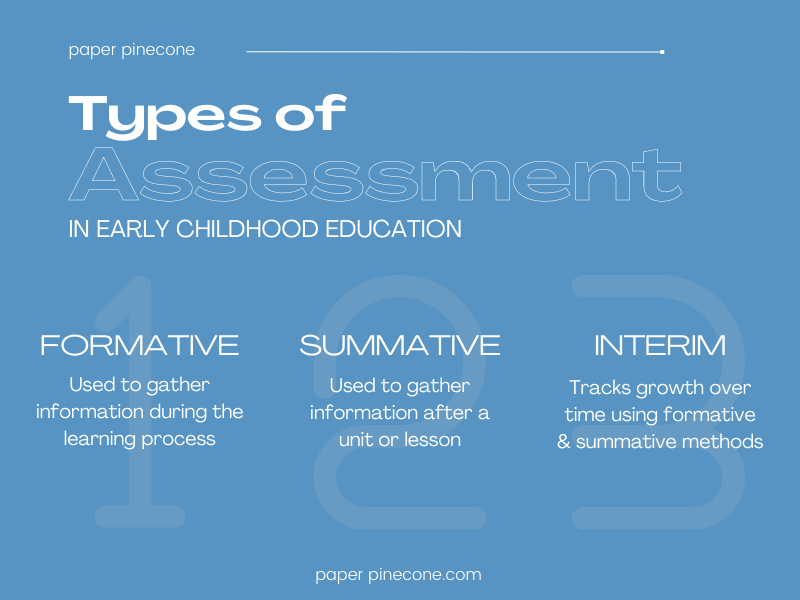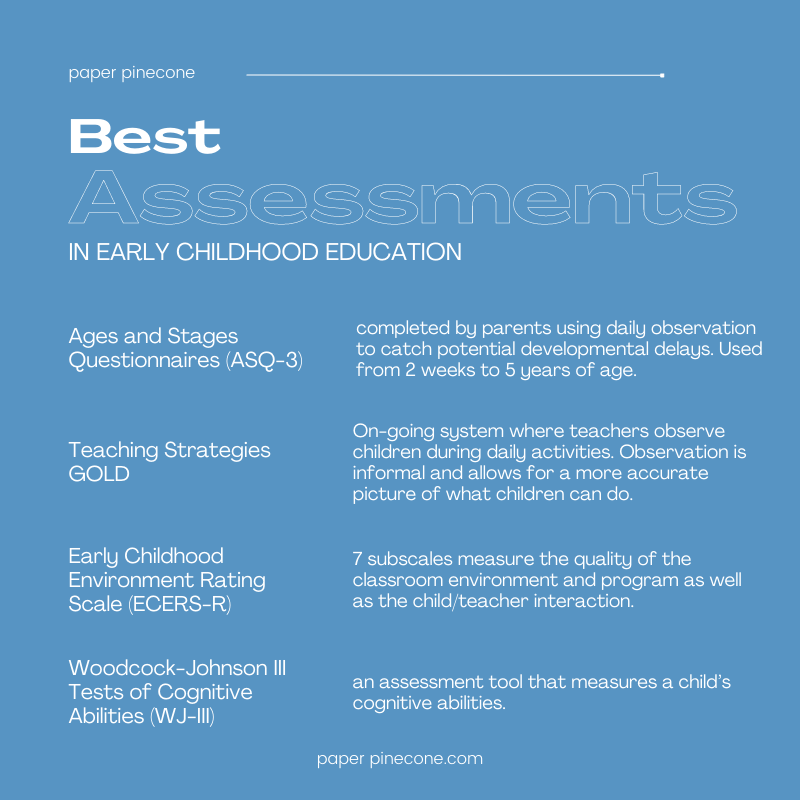Assessments in Early Childhood Education Programs

Published Date: 06/01/22
Evaluations in preschool can benefit educators and children
If you only have a minute...
Early childhood assessment is a specific way of monitoring children to observe, record, and track development and progress against milestones.
- Monitoring young people's development gives teachers and parents knowledge about a child's strengths and what areas they need more support.
- Using informal observations, standardized assessment tools, and taking into account external factors that affect young people helps to provide the most accurate information.
- Assessing children's development benefits both young children and preschools.
- Training educators on the proper way to perform assessments is crucial to obtain accurate, actionable information.
In this article
What is assessment and evaluation in early childhood education?
Why is assessment important in early childhood education?
What are the benefits of assessment in preschools?
How is assessment performed in preschool?
What types of assessment are used in early childhood programs?
What is formal observation & informal observation?
The best assessment tools for preschools
Developmentally appropriate practice in early childhood assessment
How can you implement an assessment as part of a preschool evaluation?

What is assessment and evaluation in early childhood education?
Assessment and evaluation in early childhood education are means of collecting information about a child's development and learning. They are used to help gauge children's knowledge, comprehension, language development, and social emotional skills and identify any gaps that might exist in these areas.
Effective assessment involves an educator using their professional knowledge, knowledge of a child's personal circumstances, and a comprehensive assessment system to monitor children.
The teacher will make both formal and informal observations to collect and document information, and when that information is applied purposefully, it can significantly impact a child's learning outcomes and have tremendous benefits to a preschool program.
Importantly, an educator should not diagnosis children with any specific delays or disabilities. Instead, if there is concern, the teacher should refer the family to a specialist who will perform additional diagnostic evaluations.
In addition, a high-quality early childhood program will utilize the data to help evaluate their own approach and performance so they can continually make improvements in their classroom and in the learning experiences of each child.
Don't miss: Effective Behavior Management Strategies in Preschool

Why is assessment important in early childhood education?
We have an expected pattern of child development and a typical time by which children reach milestones. Evaluating children in preschool allows educators to identify if this pattern is not being followed and by doing so, they can support each child's particular needs.
They help teachers and parents identify children who would benefit from early intervention services. According to the CDC, "Early intervention services can change a child’s developmental path and improve outcomes for children, families, and communities." The latest research studies show that delays in development can be minimized through early intervention services.
What are the benefits of assessment in preschools?
Assessments can lead to positive outcomes for children by identifying an individual's strengths and opportunities for growth. Additionally, they can have the same impact on a school. If a preschool notices that many of their children are not reaching expected milestones at the expected rate, it might indicate an area that the preschool needs improvement in certain areas. By making the necessary improvements and monitoring child development, programs can ensure that they are delivering high-quality programming to every child.
 There are many different methods of assessment, but all can help track children's progress and help a school evaluate their curriculum.
There are many different methods of assessment, but all can help track children's progress and help a school evaluate their curriculum.
Benefits of assessment:
- Creates a record of a child's development in cognitive skills, language skills, gross and fine motor skills, social emotional skills, and approaches to learning.
- Helps identify children who may need early intervention services or additional support for their development.
- Helps keep parents informed of their child's development and fosters collaboration between educators and parents.
- Acts as a refinement tool for preschool programs, identifying opportunities for improvement and areas of strength.
- Promotes educational instruction tailored to an individual child's developmental stage, or a to a group of children at a similar developmental stage.
Related: How to Encourage Parental Involvement in Preschool
How is assessment performed in preschool?
Authentically evaluating early childhood development requires a comprehensive assessment system. With a comprehensive assessment system, multiple assessments are performed and selecting the right assessment at the right time is crucial to its effectiveness.

Educators should monitor children and assess their development at scheduled intervals through formal means and unscheduled intervals through daily observation.
There are three periods assessment can be used:
- During the learning process - this is called a formative assessment – and is used to gather information about a child’s learning so teachers can make adjustments to lessons.
- At the end of a unit or lesson - this is called a summative assessment and seeks to understand what a child has learned.
- Both during the learning process and at the end - this is called an interim assessment and is used to track growth over time.
“Our favorite children’s book!” – snail & the whale"
What types of assessment are used in early childhood programs?
Assessment of young children can be complex. While we have benchmarks for child development, within those benchmarks, there's a tremendous amount of variance from child-to-child. Educators also must be aware that the children involved may not be demonstrating the full scope of their capabilities in various areas.
For example, a child who is shy may not display their full grasp of concepts in front of others. Or a child whose parents who are English language learners may be developing language skills at a slower rate, but that doesn't mean a child has a developmental delay.
Because educators must consider each child's circumstances, to obtain an authentic assessment, it's essential that standardized assessment tools meet reliability and validity standards based on the characteristics of the individual being assessed.
Related: Understanding and Implementing an Anti-Bias Curriculum in Early Childhood Education
What are formal observation & informal observation of a child's development?
Formal observation relies on a specific tools with predefined criteria. A teacher will monitor children in different contexts and using the assessment's standards, indicate whether or not children are meeting expectations in each area.
Each assessment serves as a benchmark for the next and is used to track a child's progress.
Informal observation and assessment should occur daily in preschool. Teachers use their own professional knowledge as they interact with each child in the class to identify a child's strengths and weaknesses.
There are many different methods of formal assessment and each method uses their own type of assessment framework. An assessment framework details the desired learning outcomes as well as how those outcomes can be measured.
Also read: Creating a Trauma Sensitive Environment in Your Preschool
Best preschool assessment tools
These are considered some of the best assessments for preschools:
- Ages and Stages Questionnaires (ASQ-3) – a screening tool that is completed by parents using daily observation to catch potential developmental delays. Used from 2 weeks to 5 years of age.
- Teaching Strategies GOLD – assessment tool that uses 38 objectives to guide teachers along. On-going system where teachers observe children during daily activities. Observation is informal and allows for a more accurate picture of what children can do.
- Early Childhood Environment Rating Scale (ECERS-R) – 7 subscales measure the quality of the classroom environment and program as well as the child/teacher interaction.
- Woodcock-Johnson III Tests of Cognitive Abilities (WJ-III) – an assessment tool that measures a child’s cognitive abilities.
 Some of the best methods of assessing children's development
Some of the best methods of assessing children's development
Developmentally appropriate practice in early childhood assessment
Developmentally appropriate practice (DAP) is crucial in early childhood assessment, and to adhere to DAP, assessment should meet the following criteria:
- It is purposeful, reflective, ongoing, and strategic - the focus should not be standardized tests but instead, opportunities for observation, documentation, and assessment should be woven into the curriculum.
- It's designed for progress - the focus should be working toward specific developmental and education goals.
- It is organized and actionable - educators need a predetermined system to collect, document, and use information.
- It is flexible - each child should be evaluated as an individual, taking into account their background and specific circumstances, and allowing them to display their competencies in different ways.
- It is appropriate - an early childhood assessment should only be performed using tools that have been proven reliable and valid in an early childhood setting
- It is collaborative - decisions that affect children's development should be made with input and cooperation from families
- It is followed through - appropriate referrals to other professionals for additional evaluation and/or support are provided if a potential delay or disability is identified
How can you implement an assessment in preschool?
When implementing an assessment in preschool, remember these important points:
Assessment is an ongoing process. Both formal and informal observations provide opportunities to monitor children and track the child's cognitive development, physical development, and social emotional development.
- Educators must be purposeful when choosing the assessment methods they will administer.
- Assessment methods must be developmentally, culturally, and linguistically appropriate for a young person.
- Thorough training of the assessment tools should take place prior to administration.
- For the most reliable results, young people should be assessed in familiar environments by someone who is familiar to them.
- Families need to be involved in the assessment process.
- Once the data is collected, it should be reviewed and a school should use the data to guide early education classroom instruction in the best interests of the children.
The Final Word
High-quality early childhood education programs strive to provide the best learning environments for every child. Using data collected from different forms of assessment allows educators to assess programming and make improvements based upon the development and learning needs of the students. Observation is particularly appropriate for young children.
When families are involved in the process, they are better able to understand how to help their child at home and follow their progress in reaching important milestones.
An effective collaboration between home and the program increases the probability of a child’s success by providing information about the children's interests, skills, and needs. By doing so, educators and families will improve the learning outcomes of every child.
Paper Pinecone is the #1 most trusted childcare directory giving parents access to the best preschools and best daycares near you. Parents always search free and childcare providers always list free. Send inquiries about the best daycares and preschools to [email protected].
This post contains affiliate links
- stacey's blog
- Log in or register to post comments

